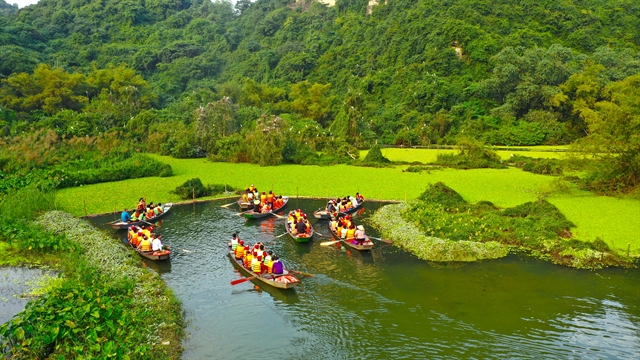
Thung Nham Bird Park, Ninh Bình Province. — VNA/VNS Photo
Vietnam News Agency has talked with Nguyễn Trùng Khánh, director of the Việt Nam National Administration of Tourism, about the long-awaited full reopening of tourism on March 15 and the many remaining obstacles.
How has the tourism sector, including the Việt Nam National Administration of Tourism (VNAT), been preparing for this ‘come-back’?
Currently, preparations for the reopening, such as ensuring safety against the COVID-19, promoting destinations and products, linking efforts and cooperation, etc. have been running well. All service businesses are ready to offer products that are suitable for new demands, trends and situations.
The tourism industry has drafted a plan to reopen tourism services to ensure COVID-19 prevention and control while creating maximum convenience for tourism agencies, businesses, and visitors – protocols that are uniformly applied nationwide, ensuring scientificalness, safety and effectiveness.
The health ministry has drafted policies meant to replace the old entry and COVID-19 requirements, but in the new context, we hope that the health ministry will soon issue an official, detailed document the tourism sector can follow when tourism reopens.
The VNAT has created favourable mechanisms and policies to support businesses and help them develop human resources, devised and deployed funding packages to support training and re-training for the tourism industry’s workforce.
The VNAT is also continuing to propose to the Government to extend the policies like reduction of electricity price, land rent, travel business licence fee, and fees for issuance of tour guides’ cards until the end of 2023.
In order to best welcome guests, the VNAT plans to strengthen the communication and promotion campaign with the theme “Live fully in Việt Nam.”
We have suggested businesses look towards the markets in Southeast Asia, Northeast Asia, Europe, and Oceania, etc. with the priority on the countries that have mutual recognition of COVID-19 vaccine certificates with Việt Nam and countries whose citizens Việt Nam has waived visa requirements.
To safely reopen tourism, how should sectors, localities, and businesses cooperate?
Tourism is a highly intersectoral and interregional industry, so it could only flourish when there is coordination and consensus between ministries, agencies, localities, and businesses.
To safely and effectively reopen tourism activities in the coming time, the focus should be on the consistent application of COVID-19 prevention and control rules.
With regards to vaccine passport, to date, not many countries have recognised Việt Nam’s COVID-19 vaccine certificates so outbound tourism – bringing Vietnamese on overseas tours and travels – would be difficult.
Tourism authorities will coordinate with the Ministry of Foreign Affairs, the Ministry of Health, to continue to step up negotiations with other countries and territories on the recognition of Vietnamese COVID-19 vaccine documentation.
In the new normal, Việt Nam needs to restore policies to simplify entry and exit procedures for tourists to attract international visitors, for example, with regards to the unilateral, bilateral visa exemption and granting visas and e-visas for citizens from potential source markets of Việt Nam’s tourism as before the COVID-19 epidemic.
The country has also lifted restrictions on the frequency of international flights into Việt Nam since February 15, 2022.
The problem now is how can airlines and tourism businesses work together to enhance the routes connecting priority overseas markets with tourism destinations in Việt Nam, while implementing COVID-19 safety rules.
What are the obstacles that the tourism sector and businesses have been facing or likely will face during the reopening process? How will the tourism ministry be of assistance?
It should be stressed that after two years of COVID-19, most travel businesses have fallen into a dire situation, if not to say, on the verge of exhaustion.
To restore the tourism industry, we have asked the Government to continue the incentives and support policies for businesses in this sector, while we are assisting businesses as part of the post-pandemic economic recovery and development plan.
The tourism authorities are also facilitating the surveying trips for travel businesses to connect, develop tourism products and promote tourism potential.
We will also be accompanying businesses in the development of COVID-19 prevention and control protocols, and working with vocational centres to build appropriate courses for tourism human resources in the new normal.
What is the lesson the tourism sector has learnt from the pilot vaccine passport programme carried out since late last year?
With this pilot vaccine programme, Việt Nam was among the first countries in the region and the world to welcome back foreign tourists, demonstrating our reputation and ability to control COVID-19 thanks to a successful COVID-19 vaccination campaign.
Still, the pilot programme has only received merely 10,000 tourists due to still in-place COVID-19 restrictions, like pre-entry approval of all arrivals and cumbersome visa procedures, which have made it quite difficult to reconnect with priority markets like before the pandemic, undermining the attractiveness of Việt Nam as a destination, whereas many countries in the region have more flexible visa procedures for foreign tourists.
The policy to allow foreign tourists to travel freely (have contacts with the community) only after completing the seven-day ‘package tourism’, which has a limited number of designated destinations, during the pilot period is also making it difficult to attract long-haul holidaymakers.
Visitors want to have the freedom to travel and choose services and products offered by the local communities, right after obtaining negative COVID-19 test results on entry.
The pilot programme also is limited to arrivals via air routes, without taking into account the passengers from road and sea routes, which is also a big potential market, and abandoning this market makes it challenging to increase international visitors to Việt Nam.
The health ministry since mid-December last year has allowed travel agencies to organise outbound tours for people in Việt Nam, but the implementation is not ‘feasible’ at the moment since many countries still have not recognised Việt Nam’s COVID-19 vaccine certificates. — VNS
OVietnam